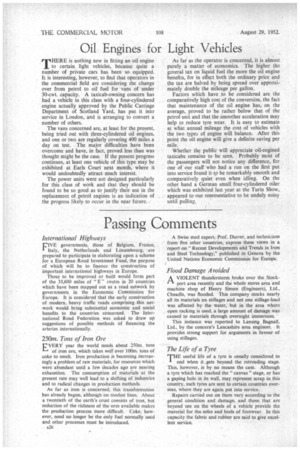Oil Engines for Light Vehicles
Page 28

If you've noticed an error in this article please click here to report it so we can fix it.
THERE is nothing new in fitting an oil engine to certain light vehicles, because quite a number of private cars has been so equipped. It is interesting, however, to find that operators in the commercial field are considering the change over from petrol to oil fuel for vans of under 30-cwt. capacity. A taxicab-owning concern has had a vehicle in this class with a four-cylindered engine actually approved by the Public Carriage Department of Scotland Yard, has put it into service in London, and is arranging to convert a number of others.
The vans concerned are, at least for the present, being tried out with three-cylindered oil engines, and one or two are regularly covering 400 miles a day on test The major difficulties have been overcome and have, in fact, proved less than was thought might be the case. If the present progress continues, at least one vehicle of this type may be exhibited at Earls Court next month, where it would undoubtedly attract much interest.
The power units were not designed particularly for this class of work and that they should be found to be so good as to justify their use in the replacement of petrol engines is an indication of the progress likely to occur in the near future. As far as the operator is concerned, it is almost purely a matter of economics. The higher the general tax on liquid fuel the more the oil engine benefits, for in effect both the ordinary price and the tax are halved by being spread over approxi-. rnately double the mileage per gallon.
Factors which have to be considered are the comparatively high cost of the conversion, the fact that maintenance of the oil engine has, an the average, proved to be rather below that of the petrol unit and that the Smoother acceleration may help to reduce tyre wear. It is easy to estimate at what annual mileage the cost of vehicles with the two types of engine will balance, After this point the oil engine will give a definite saving per mile.
Whether the public will appreciate oil-engined taxicabs remains to be seen. Probably most of the passengers will not notice any difference, for one of our staff who had a run on the first put into service found it to be remarkably smooth and comparatively quiet even when idling. On the other hand a German small four-cylindered oiler which was exhibited last year at the Turin Show, appeared to our representative to be unduly noisy until pulling.,




















































































